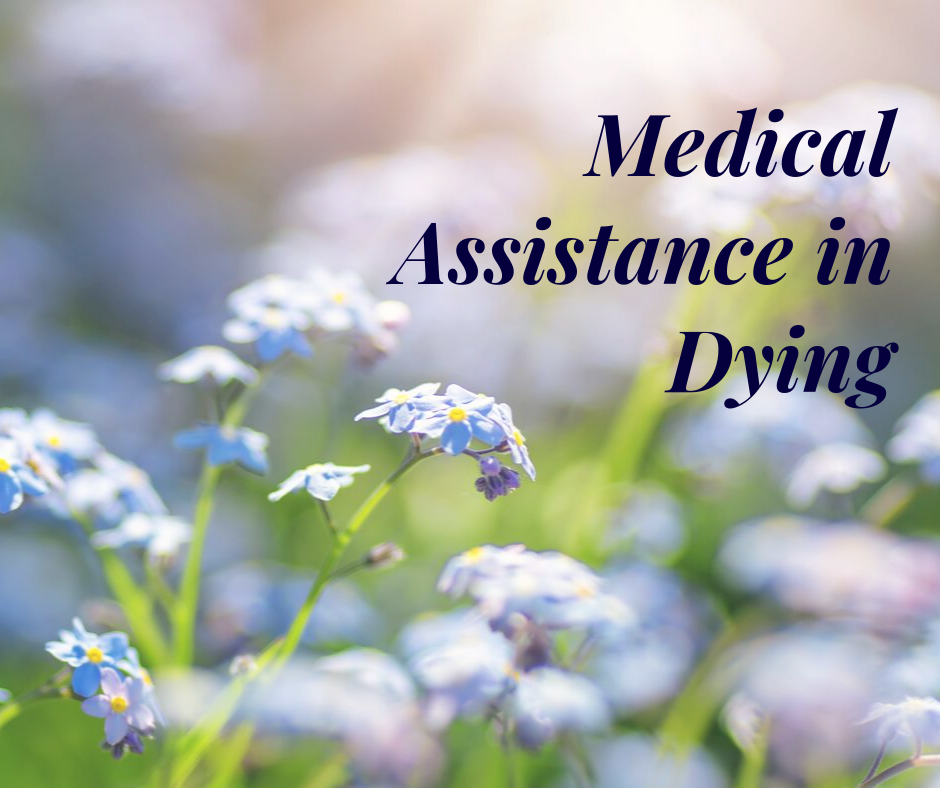In June of 2016, the Parliament of Canada passed a federal law that Canadians would be able to request medical assistance in dying. Physicians and sometimes nurse practitioners are the only ones who can provide medical assistance in dying, if they feel comfortable in that situation. This law is specifically for persons who live with chronic illnesses that are incurable and involve an immense amount of physical and mental suffering.
The current law does not allow for persons living with any mental illnesses, including dementia, to make decisions about assisted death. This law states that persons must be competent upon making this advanced decision and right before medical assistance in dying. While people with dementia are typically quite competent in the early stages, unfortunately as their dementia progresses, they are no longer seen as competent enough to make decisions about their end of life requests. This poses a variety of challenges for people living with dementia and their families. Many persons living with dementia are challenging this law as a way to take charge of their lives and make requests based on their own choices.
There are many challenges to this as persons with dementia should make their own choices about their health but need to be provided with a safe, legal space. Some persons with dementia feel that they want to take control of their dementia and receive medical assistance in dying prior to late stage dementia. Others might not want their relatives to make decisions for them. Many challenges can arise if others make decisions on their behalf, and it is important for persons with dementia to have their wishes heard and understood. Some relatives might abuse this advanced request and it is important to know that many persons with dementia live well in their communities for many years after diagnosis, and it would be upsetting for them to receive medical assistance in dying if they did not make that choice. This becomes a difficult conversation to have.
In order for persons living with dementia to receive medical assistance in dying, the law must change. But it is a challenging situation, as many persons with dementia deserve to have rights, but also deserve to be treated equally and fairly by the people closest to them. To begin this discussion, it is important to discuss your health wishes with your loved ones early, this may be before diagnosis or immediately after diagnosis. Meet with a legal consultant and inform them about your wishes about your own health. That way, the family has this information legally written down and understands a person's wishes in the future. While medical assistance in dying at this time is not possible for people living with dementia, it is important to understand that many persons living with dementia can live well in their communities for many years, with the support of various resources that are made available to them. Thus, at the present time, support your loved ones with dementia and help to maintain or improve their quality of life. Reach out to others for support and have a discussion with your physician about various resources and options fit for your situation.
References
Alzheimer Society of Canada (December 12, 2018). Medical assistance in dying for people with dementia: Position statement. Retrieved from https://alzheimer.ca/sites/default/files/files/national/position-statements/medical-assistance-in-dying-for-people-with-dementia.pdf
CBC News (September 29, 2018). Ontario man with dementia on crusade to plan his own death. Retrieved from https://www.cbc.ca/radio/thesundayedition/the-sunday-edition-september-30-2018-1.4841264/ontario-man-with-dementia-on-crusade-to-plan-his-own-death-1.4841267
Government of Canada (April 25, 2019). Medical assistance in dying. Retrieved from https://www.canada.ca/en/health-canada/services/medical-assistance-dying.html

